-
01-01-2016
Prevention and monitoring of delirium in older adults: an educational intervention
Revista Brasileira de Enfermagem. 2016;69(4):725-732
Abstract
Prevention and monitoring of delirium in older adults: an educational intervention
Revista Brasileira de Enfermagem. 2016;69(4):725-732
DOI 10.1590/0034-7167.2016690416i
Views0See moreABSTRACT
Objective:
to conduct an educational intervention with the nursing team members of an intensive care unit (ICU), aiming to increase knowledge and to introduce improvements in their practices regarding prevention and monitoring of delirium in older patients.
Method:
this is an action research, in which workshops were conducted with eleven nurses and a nursing technician from an ICU unit in Salvador, Bahia, Brazil.
Results:
ten problems regarding nursing practices for prevention and monitoring of delirium were identified. Educational, practical, technical, and managerial actions were planned, involving cross-sector connections for planning ways to solve these problems. The groups reported significant changes in the practices, with the implementation of drug-free measures for preventing and managing the situation.
Conclusion:
the educational intervention contributed to improve the nursing practices in the ICU unit studied, and it also favored the development of critical thinking about the problems mentioned, thus enabling permanent review of offered treatments.
-
01-01-2016
Technology-dependent children and the demand for pharmaceutical care
Revista Brasileira de Enfermagem. 2016;69(4):718-724
Abstract
Technology-dependent children and the demand for pharmaceutical care
Revista Brasileira de Enfermagem. 2016;69(4):718-724
DOI 10.1590/0034-7167.2016690415i
Views0See moreABSTRACT
Objective:
to understand the experience of mothers of technology-dependent children as regards pharmaceutical care.
Method:
this was a qualitative, descriptive-exploratory study developed based on open interviews using a structured characterization tool, and applied during home visits to 12 mothers caring for technology-dependent children. The data was submitted to inductive content analysis.
Results:
this study is split into two themes: (i) maternal overload during pharmaceutical care, demonstrating the need to administer drugs continuously and the repercussions of this exhaustive care on the caregivers; (ii) the ease or difficulty of access to the medicines required, showing informal strategies and support networks.
Conclusion:
pharmaceutical care is a daily challenge expressed in maternal overload and difficulty accessing the drugs, made worse by failures in the care network and coordinated care.
-
01-01-2016
Fasting of less than eight hours in urgent and emergency surgeries versus complication
Revista Brasileira de Enfermagem. 2016;69(4):712-717
Abstract
Fasting of less than eight hours in urgent and emergency surgeries versus complication
Revista Brasileira de Enfermagem. 2016;69(4):712-717
DOI 10.1590/0034-7167.2016690414i
Views0See moreABSTRACT
Objective:
to verify the occurrence of intraoperative and postoperative complications in patients undergoing urgent and emergency surgical procedures between January and December 2012, with fasting time of less than 8 hours.
Method:
a quantitative study was conducted, of the retrospective cohort type, through the analysis of medical records.
Results:
we included 181 records of patients undergoing surgical procedures with average duration of 59.4 minutes. Fractures correction surgeries stood out, totalling 32% of cases. We observed complications in 36 patients (19.9%), vomiting being the most prevalent (47.2%); followed by nausea (16.7%); need for blood transfusion (13.9%); surgical site infection (11.1%); and death (11.1%). The average fasting time was 133.5 minutes. The fasting time showed no statistically significant correlation with the complications investigated.
Conclusion:
intraoperative and postoperative complications were associated with the clinical conditions of the patients and not with the fasting time.
-
01-01-2016
Validation to Portuguese of the Debriefing Experience Scale
Revista Brasileira de Enfermagem. 2016;69(4):705-711
Abstract
Validation to Portuguese of the Debriefing Experience Scale
Revista Brasileira de Enfermagem. 2016;69(4):705-711
DOI 10.1590/0034-7167.2016690413i
Views1See moreABSTRACT
Objective:
to translate and validate to Portuguese the Debriefing Experience Scale jointly with individuals that used high-fidelity simulation in learning.
Method:
methodological and exploratory study for an instrument translation and validation. For the validation process, the event “III Workshop Brazil – Portugal: Care Delivery to Critical Patients” was created.
Results:
103 nurses attended. Validity and reliability of the scale, the correlation pattern among variables, the sampling adequacy test, and the sphericity test showed good results. Since there was no relationship among the groups established in the exploratory factor analysis, the option was to follow the division established by the original version.
Conclusion:
the version of the instrument was called Escala de Experiência com o Debriefing. The results showed good psychometric properties and a good potential for use. However, further studies will contribute to consolidate the validity of the scale and strengthen its potential use.
-
01-01-2016
Factor analysis of an instrument to measure the impact of disease on daily life
Revista Brasileira de Enfermagem. 2016;69(4):697-704
Abstract
Factor analysis of an instrument to measure the impact of disease on daily life
Revista Brasileira de Enfermagem. 2016;69(4):697-704
DOI 10.1590/0034-7167.2016690412i
Views0See moreABSTRACT
Objective:
to verify the structure of factors of an instrument to measure the Heart Valve Disease Impact on Daily Life (IDCV) when applied to coronary artery disease patients.
Method:
the study included 153 coronary artery disease patients undergoing outpatient follow-up care. The IDCV structure of factors was initially assessed by means of confirmatory factor analysis and, subsequently, by exploratory factor analysis. The Varimax rotation method was used to estimate the main components of analysis, eigenvalues greater than one for extraction of factors, and factor loading greater than 0.40 for selection of items. Internal consistency was estimated using Cronbach’s alpha coefficient. Results: confirmatory factor analysis did not confirm the original structure of factors of the IDCV. Exploratory factor analysis showed three dimensions, which together explained 78% of the measurement variance.
Conclusion:
future studies with expansion of case selection are necessary to confirm the IDCV new structure of factors.
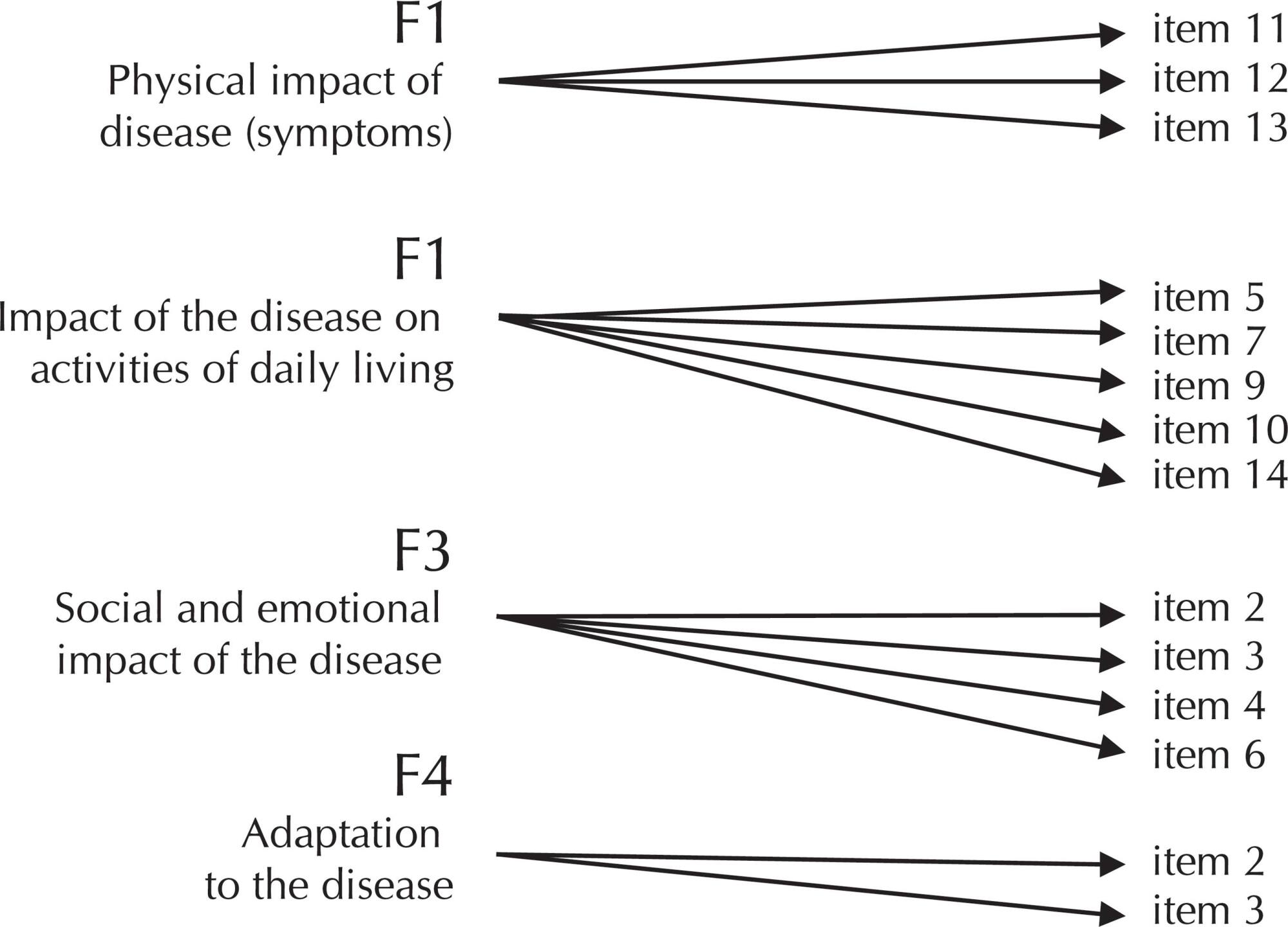
-
01-01-2016
Association of frailty in hospitalized and institutionalized elderly in the community-dwelling
Revista Brasileira de Enfermagem. 2016;69(4):691-696
Abstract
Association of frailty in hospitalized and institutionalized elderly in the community-dwelling
Revista Brasileira de Enfermagem. 2016;69(4):691-696
DOI 10.1590/0034-7167.2016690411i
Views0See moreABSTRACT
Objective:
to investigate the association between frailty with hospitalization and institutionalization in a follow-up study of elderly residents.
Method:
the follow-up study was performed in 2008 and 2013 with elderly of both genders, aged 65 years and older who were living in the community-dwelling. The sampling procedure performed was probabilistic, with dual-stage clustering. In 2008, 515 elderly people were interviewed and, in 2013, 262. We used the socioeconomic and demographic data, self-reported morbidity, specific data of hospitalization and institutionalization. Frailty was measured by the Edmonton Frail Scale (EFS), and functional capacity through the Functional Independence Measure.
Results:
we found the mean gross EFS score was higher among resident elderly who were hospitalized and institutionalized and was statistically significant in both investigated years.
Conclusion:
the confirmation of association between frailty and hospitalization and institutionalization reinforces the importance of the subject, and highlights frailty as an important tool for risk estimates for these adverse events.
-
01-01-2016
Associação da fragilidade em idosos internados e institucionalizados na comunidade
Revista Brasileira de Enfermagem. 2016;69(4):691-696
Abstract
Associação da fragilidade em idosos internados e institucionalizados na comunidade
Revista Brasileira de Enfermagem. 2016;69(4):691-696
DOI 10.1590/0034-7167.2016690411i
Views0See moreRESUMEN
Objetivo:
investigar la asociación entre la fragilidad y la internación e institucionalización, en un estudio de acompañamiento de residentes ancianos.
Método:
el estudio de acompañamiento fue realizado en 2008 y 2013, con ancianos de ambos sexos, de 65 años o más, los cuales vivían en la comunidad. El procedimiento de muestreo realizado fue probabilístico, con agrupamiento en dos etapas. Fueron entrevistados 512 ancianos en 2008 y 262 en 2013. Datos socioeconómicos y demográficos, morbilidad relatada por los mismos y datos específicos de internación e institucionalización han sido utilizados. La fragilidad fue medida por la escala Edmond Frail Scale (EFS) y la capacidad funcional por la escala Functional Independence Measure (FIM).
Resultados:
El promedio de la puntuación EFS fue mayor entre los residentes ancianos que fueron internados y hospitalizados, siendo estadísticamente significativa en los dos años investigados.
Conclusión:
La confirmación de la asociación entre la fragilidad y la internación e institucionalización refuerza la importancia del tema y enfatiza la fragilidad como un instrumento importante en la evaluación de los riesgos para estos eventos adversos.
-
01-01-2016
Analysis of managerial and healthcare indicators after nursing personnel upsizing
Revista Brasileira de Enfermagem. 2016;69(4):684-690
Abstract
Analysis of managerial and healthcare indicators after nursing personnel upsizing
Revista Brasileira de Enfermagem. 2016;69(4):684-690
DOI 10.1590/0034-7167.2016690410i
Views0See moreABSTRACT
Objective:
analyze healthcare and managerial indicators after nursing personnel upsizing.
Method:
a retrospective, descriptive study was conducted using data from computer systems of a university hospital in southern Brazil. Healthcare and managerial indicators related to the first half of 2013 and 2014 were statistically analyzed.
Results:
increases of 40.0% in the number of nurses and 16.0% in the number of nursing technicians led to reductions of 12.0% in the number of sickness absences, 21.8% in positive balance for compensatory time off, 92.0% in paid overtime. Reductions of 75.0% in pressure ulcer rates, 10.5% in the number of falls and 50.0% in infections due to indwelling catheter use were also observed.
Conclusion:
nursing staff upsizing caused a positive impact on managerial and healthcare indicators and helped qualify care and improve work conditions for the nursing team.
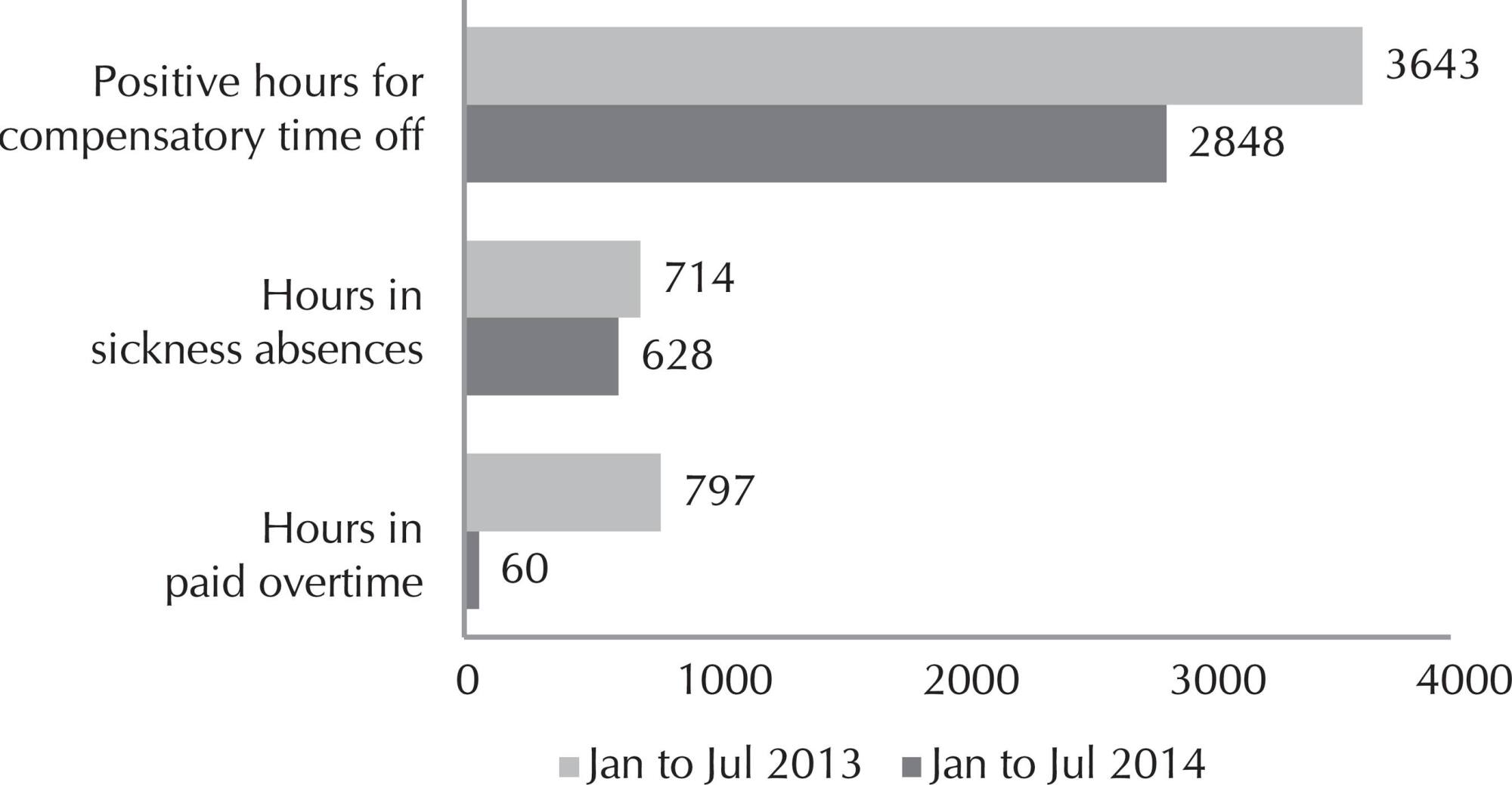
-
ORIGINAL ARTICLE06-14-2021
Continuity of neuro-psychomotor stimulation of children with congenital Zika syndrome
Revista Brasileira de Enfermagem. 2021;74(6):e20200694
Abstract
ORIGINAL ARTICLEContinuity of neuro-psychomotor stimulation of children with congenital Zika syndrome
Revista Brasileira de Enfermagem. 2021;74(6):e20200694
DOI 10.1590/0034-7167-2020-0694
Views0See moreABSTRACT
Objective:
Understand the continuity of stimulation of neuro-psychomotor development in children with congenital Zika syndrome.
Method:
Descriptive-exploratory study with theoretical support in symbolic interactionism. Between August and November 2019, 12 health professionals were interviewed in depth; and to the focus group, seven caregivers of children with the syndrome. The analysis was thematic inductive.
Results:
The continuation of neuro-psychomotor stimulation of children with Zika syndrome goes through: organizational difficulties (lack of doctors, professional unpreparedness, dissatisfaction and search for other services); socioenvironmental aspects (low maternal education, low socioeconomic level, difficulty in moving and lack of support); and conditions inherent to children (hospitalizations for respiratory crises, seizures, hypoactivity and social stigma).
Final considerations:
A strengthened support network with qualified human resources is necessary in order to provide comprehensive care and avoid the discontinuity of neuro-psychomotor stimulation of children with congenital Zika syndrome.
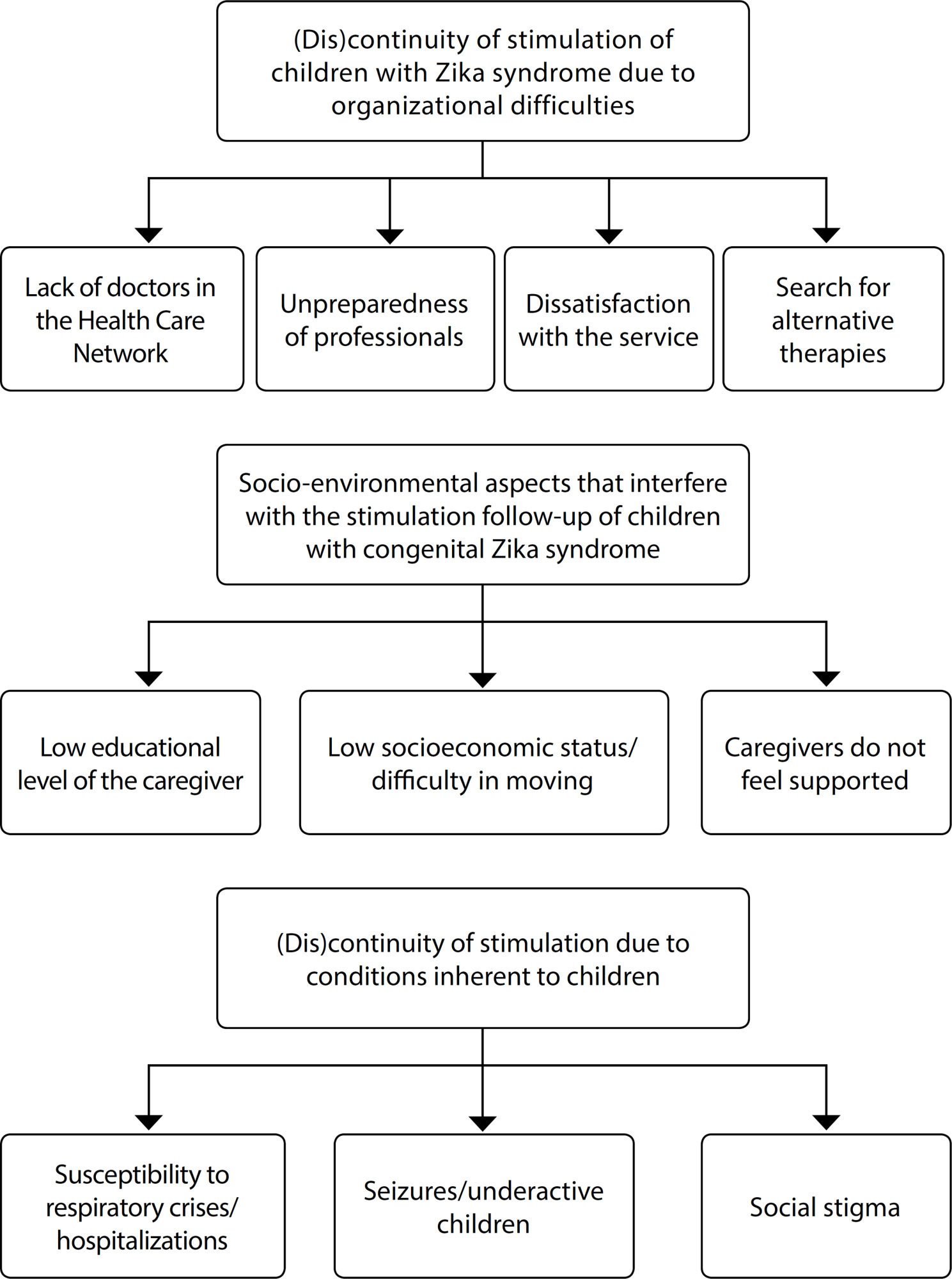
-
ORIGINAL ARTICLE08-20-2021
Risk of suicide among nursing students
Revista Brasileira de Enfermagem. 2021;74(6):e20200867
Abstract
ORIGINAL ARTICLERisk of suicide among nursing students
Revista Brasileira de Enfermagem. 2021;74(6):e20200867
DOI 10.1590/0034-7167-2020-0867
Views0See moreABSTRACT
Objectives:
to identify the risk and degree of risk of suicide in nursing students of a public institution in the countryside of Pernambuco, Brazil.
Methods:
this was a cross-sectional, quantitative research conducted with 150 students. For data collection, a sociodemographic questionnaire and the instrument, M.I.N.I. – Brazilian version 5.0.0 – Module C – Risk of suicide were used. Statistical analyses were performed with IBM(® )SPSS(®), version 23.
Results:
53.3% of nursing students had a risk of suicide, of which 20.7% had a high risk. Moreover, 22.67% reported previous suicide attempt. It is noteworthy that students without a partner have a higher risk of suicide (56.8%) than those with a partner (29.4%).
Conclusions:
it is perceived the need to develop programs that identify students at risk of suicide in higher education institutions, in order to raise awareness of the problem and implement policies to promote mental health in the academia.
-
REVIEW08-20-2021
Root Cause Analysis, Failures and Effects in pediatric total quality management: a scoping review
Revista Brasileira de Enfermagem. 2021;74(6):e20200954
Abstract
REVIEWRoot Cause Analysis, Failures and Effects in pediatric total quality management: a scoping review
Revista Brasileira de Enfermagem. 2021;74(6):e20200954
DOI 10.1590/0034-7167-2020-0954
Views0See moreABSTRACT
Objectives:
to analyze the applicability of Root Cause Analysis and Failure Mode and Effect Analysis tools, aiming to improve care in pediatric units.
Methods:
this is a scoping review carried out according to the Joanna Briggs Institute guidelines, following the Preferred Reporting Items for Systematic Reviews and Meta-Analyzes extension for Scoping Reviews. Search took place in May 2018 on 15 data sources.
Results:
search totaled 8,254 studies. After using the relevant inclusion and exclusion criteria, 15 articles were included in the review. Of these, nine were published between 2013 and 2018, 12 used Failure Mode and Effect Analysis and 11 carried out interventions to improve the quality of the processes addressed, showing good post-intervention results.
Final Considerations:
the application of the tools indicated significant changes and improvements in the services that implemented them, proving to be satisfactory for detecting opportunities for improvement, employing specific methodologies for harm reduction in pediatrics.
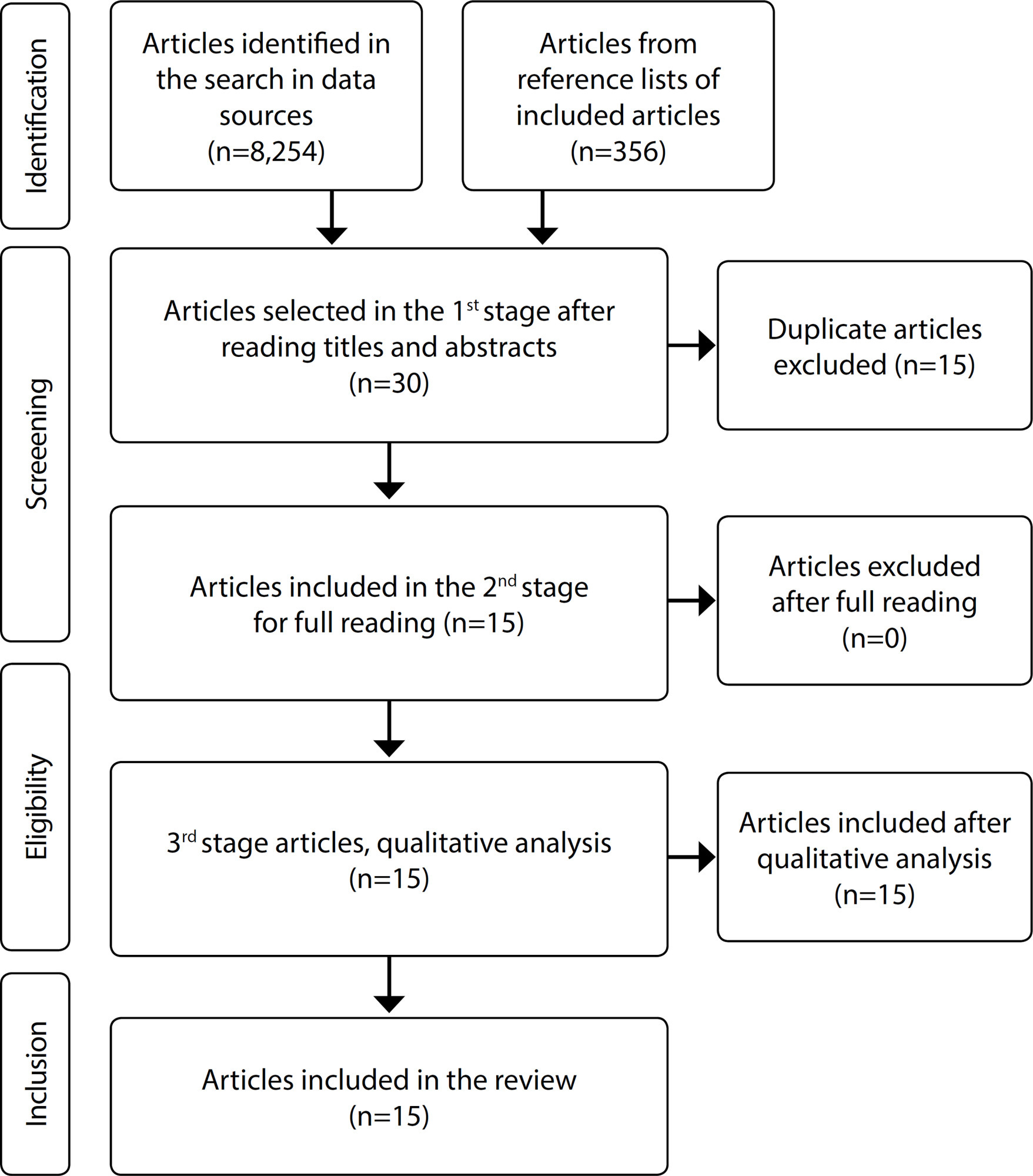
-
ORIGINAL ARTICLE07-26-2021
Representations about sexuality of people diagnosed late with HIV infection
Revista Brasileira de Enfermagem. 2021;74(6):e20201028
Abstract
ORIGINAL ARTICLERepresentations about sexuality of people diagnosed late with HIV infection
Revista Brasileira de Enfermagem. 2021;74(6):e20201028
DOI 10.1590/0034-7167-2020-1028
Views0See moreABSTRACT
Objective:
to understand the representations about sexuality of people diagnosed late with HIV infection and its implications in the delayed search for diagnosis.
Methods:
this is a qualitative study, whose theoretical and methodological framework was Social Representation Theory. The research was carried out with 18 people diagnosed late with HIV infection through an open interview. For data analysis, Structural Narration Analysis was used, with support from MAXQDA 12®.
Results:
representations about sexuality contributed to delayed diagnosis, such as trust in a fixed partnership, sexual intercourse is natural, sexuality as a taboo, search for pleasure in sexual intercourse, regardless of risks, denial of risk for HIV infection.
Final considerations:
representations about sexuality participate in a web of stereotypes and riskier ways of living, which contribute to delayed diagnosis. Sexual health education remains necessary and essential throughout people’s lives.
-
08-20-2021
Prevalence of central venous catheter salvage in newborn with staphylococcal bloodstream infection
Revista Brasileira de Enfermagem. 2021;74(6):e20201073
Abstract
Prevalence of central venous catheter salvage in newborn with staphylococcal bloodstream infection
Revista Brasileira de Enfermagem. 2021;74(6):e20201073
DOI 10.1590/0034-7167-2020-1073
Views0See moreABSTRACT
Objectives:
to establish the prevalence of salvage of central venous catheters in newborns with bloodstream infection caused by coagulase-negative staphylococci.
Methods:
retrospective cross-sectional study with 136 newborns admitted to the Neonatal Intensive Care Unit between 2011 and 2017. The total of 143 infection events undergoing antibiotic therapy were evaluated.
Results:
among the 143 infection events, 39 catheters in which antibiotic therapy was used were saved and in 69 cases, the device was removed. Positive central blood culture and single lumen catheter were factors associated with salvage failure. The probability of salvage decreased with infections diagnosed from 15 days of using the catheter. Negative blood culture raised the chance of salvage by fourfold.
Conclusions:
the use of antibiotic therapy in the treatment of infections resulted in a low prevalence of salvage of the central venous catheter. The probability of salvage was associated with variables of the device.
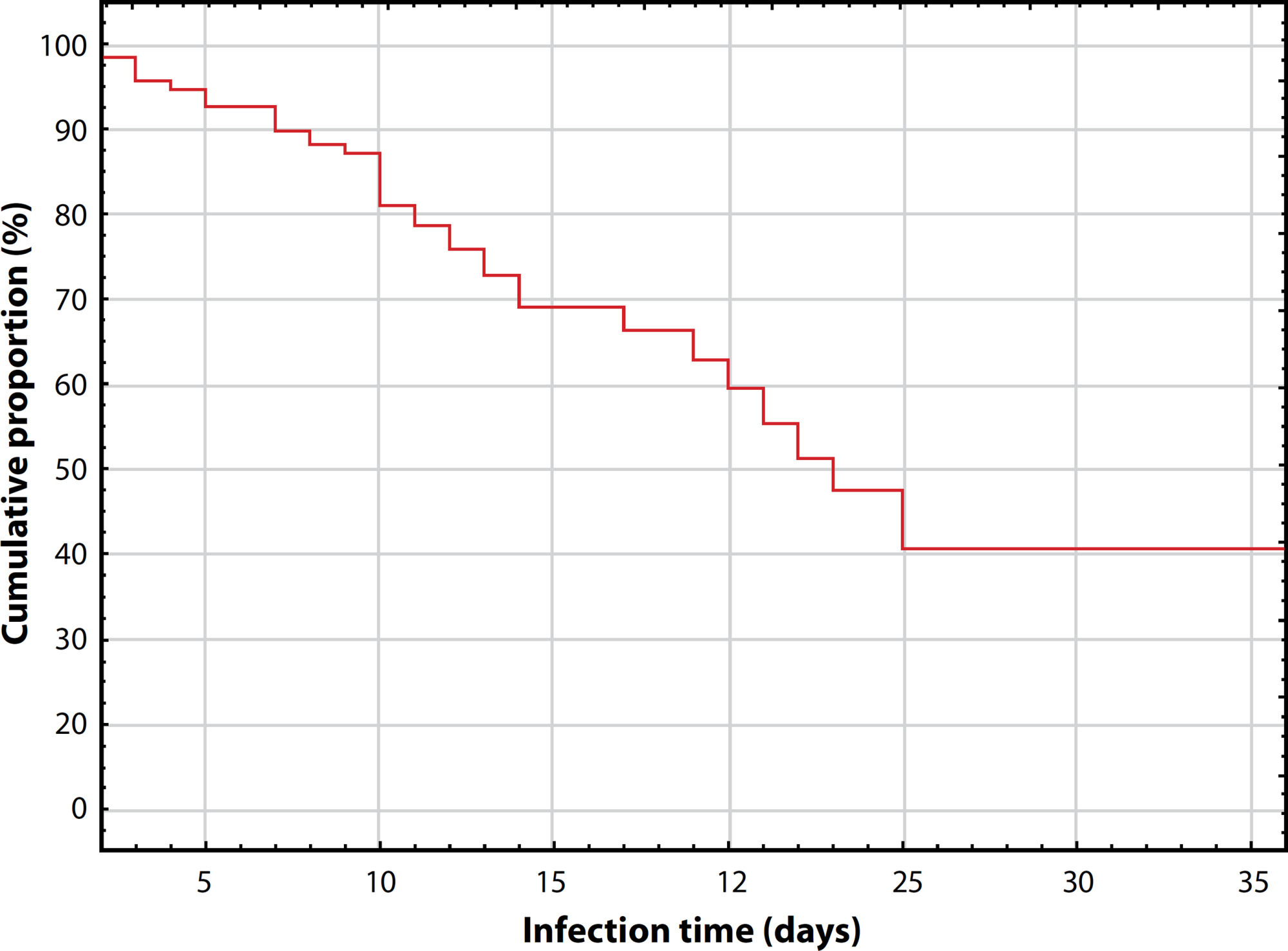
-
EXPERIENCE REPORT02-15-2021
Coronavirus infections: health care planning based on Orem’s Nursing Theory
Revista Brasileira de Enfermagem. 2021;74:e20200281
Abstract
EXPERIENCE REPORTCoronavirus infections: health care planning based on Orem’s Nursing Theory
Revista Brasileira de Enfermagem. 2021;74:e20200281
DOI 10.1590/0034-7167-2020-0281
Views0See moreABSTRACT
Objective:
to report the experience of professors and students of a graduate course on nursing care in coping with the new coronavirus (COVID-19) based on Self-Care Theory.
Method:
the active methodologies used were a literature search and seminar presentations, with an understanding of Orem’s theoretical concepts: health; man; self-care; universal, developmental and health deviation requirements; self-care activities; self-care deficits; the required therapeutic demand; nursing systems. The pandemic was considered a health deviation that requires critical thinking and nursing care planning. Methodological frameworks to classify nursing diagnoses, interventions, and outcomes were used.
Results:
for each health deviation, nursing systems were identified; self-care deficits, diagnoses; actions, interventions; and the form of assessment, outcomes.
Final considerations:
theoretical-practical reflections of the academic context support nursing care planning.
-
REFLECTION03-05-2021
Reflections on patient safety incident reporting systems
Revista Brasileira de Enfermagem. 2021;74:e20200307
Abstract
REFLECTIONReflections on patient safety incident reporting systems
Revista Brasileira de Enfermagem. 2021;74:e20200307
DOI 10.1590/0034-7167-2020-0307
Views0See moreABSTRACT
Objective:
To reflect on the main characteristics and recommendations of Incident Reporting Systems, discuss the population’s participation in reporting, and point out challenges in the Brazilian system.
Method:
Reflection study, based on Ordinance No. 529/13, which instituted the National Patient Safety Program, under Collegiate Board Resolution (CBR) No. 36/13; reflections by experts were added.
Results:
Reporting systems are a source for learning and monitoring, allow early detection of incidents, investigations and, mainly, the generation of recommendations prior to recurrences, in addition to raising information for patients and relatives. There is little participation of the population in the reporting, regardless of the type of system and characteristics such as confidentiality, anonymity, and mandatory nature.
Final Considerations:
In Brazil, although reporting is mandatory, there is an urgency to advance the involvement and participation of the population, professionals, and institutions. To simplify data entry by improving the interface and importing data from the reporting system is an objective to be achieved.
-
EXPERIENCE REPORT01-29-2021
Restructuring service at a mastology outpatient clinic during the COVID-19 pandemic
Revista Brasileira de Enfermagem. 2021;74:e20200571
Abstract
EXPERIENCE REPORTRestructuring service at a mastology outpatient clinic during the COVID-19 pandemic
Revista Brasileira de Enfermagem. 2021;74:e20200571
DOI 10.1590/0034-7167-2020-0571
Views0INTRODUCTIONCOVID-19 is a disease caused by the SARS-CoV-2 coronavirus (Severe Acute Respiratory Syndrome Coronavirus 2) and has brought a threat to public health worldwide. In need of immediate changes, adaptations tend to be the way out to avoid contamination that potentially does not distinguish race, color, gender().The global numbers of suspected and confirmed cases are […]See more
-
ORIGINAL ARTICLE07-08-2020
Nurses’ practice in quilombola communities: an interface between cultural and political competence
Revista Brasileira de Enfermagem. 2020;73(5):e20190433
Abstract
ORIGINAL ARTICLENurses’ practice in quilombola communities: an interface between cultural and political competence
Revista Brasileira de Enfermagem. 2020;73(5):e20190433
DOI 10.1590/0034-7167-2019-0433
Views1See moreABSTRACT
Objectives:
to understand Family Health Strategy nurses’ practices in the context of quilombola communities with an interface for cultural and political competences.
Methods:
a single integrated, qualitative case study carried out on seven Family Health Strategies located in the Metropolitan Region of Belo Horizonte, state of Minas Gerais. Seven nurses and 59 quilombolas participated. Data were collected through individual interviews with nurses, collective interviews with quilombolas and observation. For analysis, the thematic content analysis was adopted.
Results:
the results revealed structural and territorial problems, which are configured as barriers for professional-user encounter as well as for professional practice performance.
Final Considerations:
it is necessary that Family Health Strategy nurses, based on political and cultural competences, create strategies that minimize the difficulties found in the implementation of health actions directed to quilombolas. Such strategies anchored in inclusive public policies.
-
ORIGINAL ARTICLE08-10-2020
Grounded Theory methodological aspects in Brazilian nursing thesis
Revista Brasileira de Enfermagem. 2020;73(6):e20190274
Abstract
ORIGINAL ARTICLEGrounded Theory methodological aspects in Brazilian nursing thesis
Revista Brasileira de Enfermagem. 2020;73(6):e20190274
DOI 10.1590/0034-7167-2019-0274
Views0See moreABSTRACT
Objective:
to analyze the application of methodological aspects of Grounded Theory in Brazilian nursing thesis.
Methods:
qualitative, descriptive study elaborated based on theses available in the CAPES Thesis and Dissertations Catalog, located with the search for the terms “Teoria Fundamentada nos Dados” OR “Grounded Theory”, from 2013 to 2017. The data obtained were analyzed, considering the Grounded Theory methodological assumptions.
Results:
observance of Grounded Theory basic concepts and articulation with several theoretical frameworks in the conduct of the investigations are strengthening aspects of the method. However, dissent in the description of the operationalization of the stages and naming of the elaborated construct weaken the methodological quality.
Final considerations:
the methodological consistency provided by Grounded Theory has the potential to demonstrate the studies’ rigor and reliability conducted and theories generated. It is necessary to deepen theoretical-conceptual studies to elucidate discrepancies in the applicability in nursing research.
-
ORIGINAL ARTICLE10-26-2020
Suspected COVID-19 flu-like syndrome in men who have sex with men and have been involved in casual sex
Revista Brasileira de Enfermagem. 2020;73:e20200913
Abstract
ORIGINAL ARTICLESuspected COVID-19 flu-like syndrome in men who have sex with men and have been involved in casual sex
Revista Brasileira de Enfermagem. 2020;73:e20200913
DOI 10.1590/0034-7167-2020-0913
Views0See moreABSTRACT
Objective:
To evaluate the presence of flu-like syndrome suggestive of COVID-19 in men who have sex with men (MSM) and engaged in casual sex during a period of social isolation.
Method:
National epidemiological survey, applied in April and May 2020, by adaptation of Respondent Drive Sampling.
Results:
1,337 MSM participated in the survey, of which 514 (38.4%) had fever associated with another sign or symptom of flu-like syndrome. Social, demographic characteristics, sexual practices and activities during the period of social isolation were statistically associated with the presence of flu-like syndrome. There was a statistical difference (p < 0.001) in the average of partners between those who had signs and symptoms of flu-like syndrome (3.5) and those who did not (1.7).
Conclusion:
Evidence of signs and symptoms indicative of flu-like syndrome suggestive of COVID 19 in Brazilian MSM who were involved in casual sex during the period of social isolation.

-
ORIGINAL ARTICLE10-21-2019
Consumption of alcohol and drugs and school absenteeism among high school students of public schools
Revista Brasileira de Enfermagem. 2019;72(6):1692-1698
Abstract
ORIGINAL ARTICLEConsumption of alcohol and drugs and school absenteeism among high school students of public schools
Revista Brasileira de Enfermagem. 2019;72(6):1692-1698
DOI 10.1590/0034-7167-2018-0828
Views0See moreABSTRACT
Objective:
To evaluate the relation between the consumption of alcohol and other drugs and school absenteeism in high school students of public schools in the 30 days prior to data collection.
Method:
Cross-sectional study of quantitative character conducted from May to September 2017, with 282 high school students of public schools of Mossoró-RN. We used a closed questionnaire with questions about drug consumption as our instrument of analysis. We performed hierarchical binary logistic regression by using the SPSS 20.0.
Results:
In bivariate analysis, the relation between absenteeism and drug consumption patterns proved to be significant to those who engage in heavy episodic drinking of alcohol and in the use of tobacco, inhalants and marijuana. The adjusted regression model only included the variables tobacco and heavy episodic drinking of alcohol.
Conclusion:
The hierarchical binary logistic regression analysis corroborated with absenteeism outcomes, explaining it in 12.3% of cases.
-
ORIGINAL ARTICLE10-21-2019
Caregiver burden and stress in psychiatric hospital admission
Revista Brasileira de Enfermagem. 2019;72(6):1699-1706
Abstract
ORIGINAL ARTICLECaregiver burden and stress in psychiatric hospital admission
Revista Brasileira de Enfermagem. 2019;72(6):1699-1706
DOI 10.1590/0034-7167-2018-0832
Views0See moreABSTRACT
Objective:
to evaluate the relation between sociodemographics factors, stress and burden of care of family caregivers of patients at a psychiatric hospital admission.
Method:
quantitative study, with a cross-sectional correlation design. A total of 112 family caregivers participated, older than 18, in a Brazilian psychiatric hospital. A sociodemographic questionnaire was used to collect data, the Zarit Burden Interview and LIPP Adult Stress Symptom Inventory.
Results:
burden of care in family caregivers at a psychiatric hospital admission was significantly associated with stress (p=0.000). The psychological symptoms of stress predicted severe burden. Most caregivers presented a moderate or severe burden, with 52.7% in the resistance phase of stress; 66.1% presented psychological symptoms.
Conclusion:
results show the alarming situation of caregivers of patients from a psychiatric hospital, evidencing their own vulnerability to illness. Indeed, the during admission in a psychiatric hospital, not only patients need care, but also their caregivers.
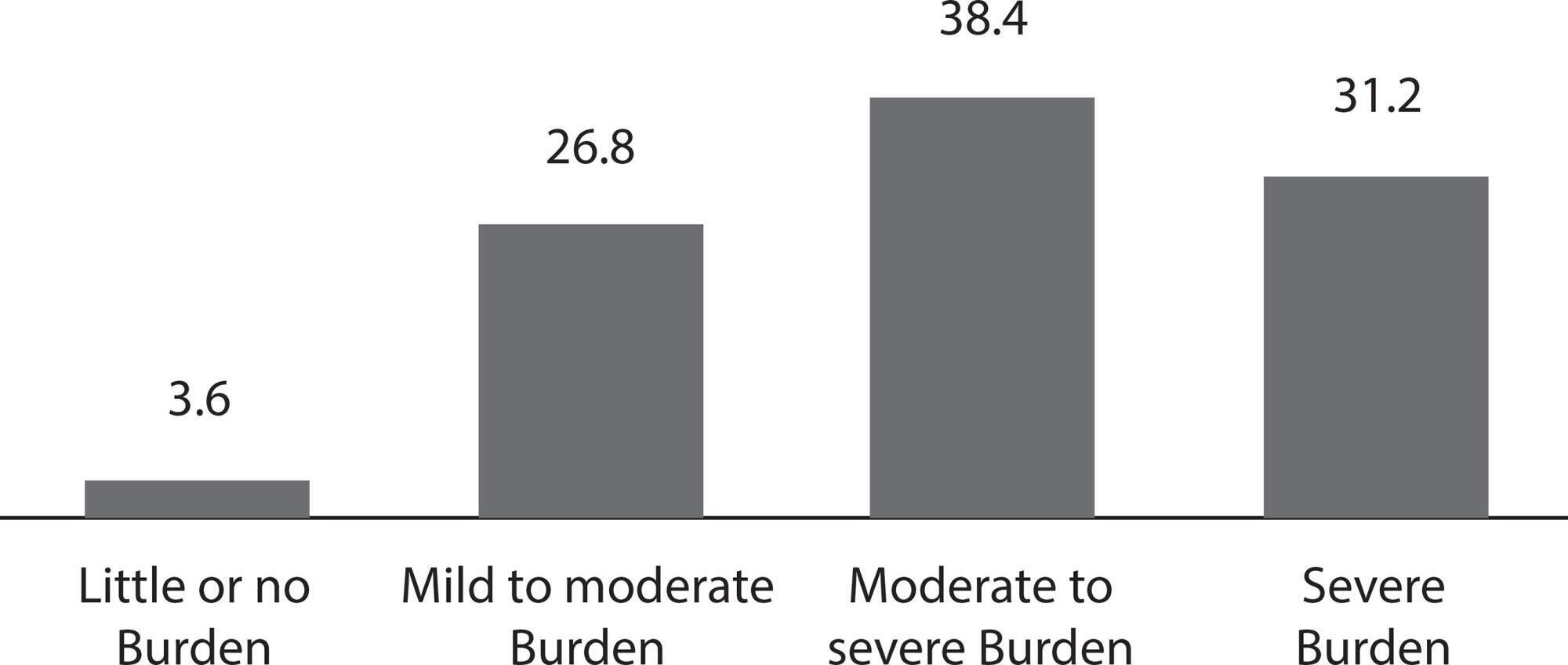
-
REFLECTION02-22-2021
Convergent care research and its qualification as scientific research
Revista Brasileira de Enfermagem. 2021;74(1):e20190657
Abstract
REFLECTIONConvergent care research and its qualification as scientific research
Revista Brasileira de Enfermagem. 2021;74(1):e20190657
DOI 10.1590/0034-7167-2019-0657
Views0See moreABSTRACT
Objectives:
to highlight the main attributes of Convergent Care Research that ratify it as a method of scientific research. Methods: it is a theoretical-reflective study on Convergent Care Research’s theoretical-methodological assumptions. Development: Convergent Care Research is compatible with the Social Constructionism paradigm. Convergent Care Research projects have two approaches: practical and conceptual. The Convergent Care Research process corpus contains five phases: conception; instrumentation; scrutiny; analysis and theorizing. Final Considerations: Convergent Care Research rigor encompasses the relationship between research and care practice, and this corresponds to the convergence of these two dimensions. Due to its theoretical foundation and criteria of methodological rigor, Convergent Care Research is aligned with scientific research methods.
-
ORIGINAL ARTICLE10-21-2019
Functional independence of elderly patients who fell: a follow-up study
Revista Brasileira de Enfermagem. 2019;72(6):1715-1722
Abstract
ORIGINAL ARTICLEFunctional independence of elderly patients who fell: a follow-up study
Revista Brasileira de Enfermagem. 2019;72(6):1715-1722
DOI 10.1590/0034-7167-2018-0845
Views0See moreABSTRACT
Objective:
to evaluate, in emergency hospital service and at home, the functional independence of elderly people who fell.
Method:
longitudinal study with 151 elderly. Functional Independence Measure (FIM) was used. Statistical tests were performed with univariate and bivariate analysis.
Results:
mean of total FIM value in the hospital was 70.4; and at home 84.3 (p <0.001). Independence was lower in the motor domain, in “self-care”, “mobility” and “locomotion” dimensions, in the two evaluations (p <0.001). Dependence reduced from 97.3% elderly in the hospital to 82.8% at home (p <0.001). There was a negative correlation between total FIM and age, number of medications, number of diseases and hospitalization time in both evaluations. Femoral and hip fractures were associated with lower total FIM values (p <0.001).
Conclusion:
the elderly had less independence in the hospital compared to at home, with greater impairment in the motor domain and “self-care”, “mobility” and “locomotion” dimensions, in the two moments evaluated.

-
ORIGINAL ARTICLE07-31-2020
Explanatory models of families of children with type 1 diabetes mellitus
Revista Brasileira de Enfermagem. 2020;73:e20180975
Abstract
ORIGINAL ARTICLEExplanatory models of families of children with type 1 diabetes mellitus
Revista Brasileira de Enfermagem. 2020;73:e20180975
DOI 10.1590/0034-7167-2018-0975
Views0See moreABSTRACT
Objectives:
to analyze how children with type 1 diabetes mellitus and their families explain the pathology, based on their understanding of the factors related to the discovery of diabetes, the etiology, treatment, and prognosis of the disease.
Methods:
qualitative methodological approach, based on medical anthropology and the narrative method. In-depth interviews were conducted with 12 families of children with type 1 diabetes mellitus attending follow-up consultations at a specialized center. The statements were subjected to inductive thematic analysis.
Results:
the explanatory models identified describe the families search for the clarification of the signs and symptoms that the child had. Faced with the disease, families reorganized themselves to meet new health care needs of children, such as adequate nutrition, physical exercise, and blood glucose monitoring.
Final Considerations:
knowing the explanatory models allows the understanding of how families give meaning to the child’s illness, favoring daily nursing care and an effective control of the disease.
Search
Search in:
Nuvem de Tags
Adolescente (85) Atenção Primária à Saúde (239) COVID-19 (91) Criança (91) Cuidados de Enfermagem (269) Educação em Enfermagem (151) Educação em Saúde (139) Enfermagem (930) Enfermagem Pediátrica (86) Estudantes de Enfermagem (77) Estudos de Validação (131) Família (87) Idoso (208) Promoção da Saúde (99) Qualidade de Vida (104) Saúde do Trabalhador (86) Saúde Mental (145) Saúde Pública (82) Segurança do Paciente (150) Tecnologia Educacional (100)



